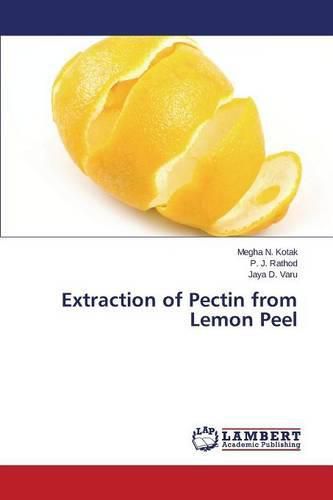Readings Newsletter
Become a Readings Member to make your shopping experience even easier.
Sign in or sign up for free!
You’re not far away from qualifying for FREE standard shipping within Australia
You’ve qualified for FREE standard shipping within Australia
The cart is loading…






This title is printed to order. This book may have been self-published. If so, we cannot guarantee the quality of the content. In the main most books will have gone through the editing process however some may not. We therefore suggest that you be aware of this before ordering this book. If in doubt check either the author or publisher’s details as we are unable to accept any returns unless they are faulty. Please contact us if you have any questions.
This Book is usefull for pharmacist, Biologist, biochemist, food technologist for the extraction of pectin from the lemon peel. The Lemon waste is the most important sources of pectin in the technologically advanced countries of the world. However, the availability of these raw materials in India is not enough to manufacture pectin sufficient enough to meet the local demand and hence a significant quantity of it is being imported from other countries every year. Therefore, it is necessary to analyze the extraction with hydrochloric acid for suitable extraction condition. Looking to above facts in view, a research theme was under taken to develop the process for extraction of pectin from lemon peels. The processing parameters of quality pectin from waste of lemon peel as well as the effect of temperature and pH on quality parameters of pectin was studied. Result showed that at a temperature 90 DegreesC (9.54%). The higher equivalent weight of pectin extracted at a pH of 1.6 (963.68g) at 70 DegreesC and the lower equivalent weight (332.62g) of pectin extracted at a pH of 2.9 and 900C. The result of SEM indicates that the surface of pectin powder is rough, and heterogeneous.
$9.00 standard shipping within Australia
FREE standard shipping within Australia for orders over $100.00
Express & International shipping calculated at checkout
This title is printed to order. This book may have been self-published. If so, we cannot guarantee the quality of the content. In the main most books will have gone through the editing process however some may not. We therefore suggest that you be aware of this before ordering this book. If in doubt check either the author or publisher’s details as we are unable to accept any returns unless they are faulty. Please contact us if you have any questions.
This Book is usefull for pharmacist, Biologist, biochemist, food technologist for the extraction of pectin from the lemon peel. The Lemon waste is the most important sources of pectin in the technologically advanced countries of the world. However, the availability of these raw materials in India is not enough to manufacture pectin sufficient enough to meet the local demand and hence a significant quantity of it is being imported from other countries every year. Therefore, it is necessary to analyze the extraction with hydrochloric acid for suitable extraction condition. Looking to above facts in view, a research theme was under taken to develop the process for extraction of pectin from lemon peels. The processing parameters of quality pectin from waste of lemon peel as well as the effect of temperature and pH on quality parameters of pectin was studied. Result showed that at a temperature 90 DegreesC (9.54%). The higher equivalent weight of pectin extracted at a pH of 1.6 (963.68g) at 70 DegreesC and the lower equivalent weight (332.62g) of pectin extracted at a pH of 2.9 and 900C. The result of SEM indicates that the surface of pectin powder is rough, and heterogeneous.